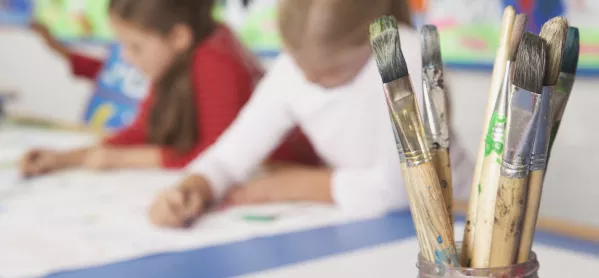Schools are cutting back on art teachers, and students are fearful of taking the subject, because of pressure to do well in the English Baccalaureate (EBacc) subjects, a new report shows.
And the emphasis on the EBacc subjects of English, mathematics, science, geography, history and modern foreign languages means students are becoming less prepared and less willing to continue with art, according to the study.
The government’s decision to leave the arts out of the EBacc is leading to lower pupil attainment, less funding and more teacher recruitment challenges, the report’s author, Professor John Last, vice-chancellor of Norwich University of the Arts (NUA), has concluded.
“The aim of education in the past was to offer a balanced curriculum of arts, humanities and sciences,” he said. “But the introduction of the English Baccalaureate in 2010 set us on a path where creativity falls outside the ‘core’ of our children’s education.
“The consequences of this downgrading of creative subjects are already being felt - in the choices pupils make about their GCSE options, in the practical creative skills they develop during their education and in the difficult decisions headteachers are making about funding and resources.”
‘Build links between the arts and sciences’
The report, A Crisis in the Creative Arts in the UK?, published by the Higher Education Policy Institute, includes the results of a review of art and design provision in 31 secondary schools in Norfolk. This showed that:
- Forty per cent of schools had seen a decrease in staffing in art and design and/or design and technology since 2010.
- Teaching hours in art and design have dropped by 13 per cent since 2010.
- Seventy-two per cent of teachers said a growing number of pupils were lacking basic drawing and painting skills when they start secondary school.
- Seventy-three per cent of teachers raised the issue of “creative stamina”, saying pupils fear that it will take too much time and effort to achieve top grades in art, compared with other subjects.
- More than half of teachers reported fewer pupils taking GCSE in art and design (57 per cent) or design and technology (59 per cent).
“Students demand the magic ‘What do I need to get an A?’,” one teacher explained to researchers.
The report concludes that the “pipeline” of talent from primary and secondary schools into universities and careers in the UK’s £84 billion creative industries is “in danger of fracturing”.
Nick Hillman, director of the Higher Education Policy Institute, said: “Everyone wants to continue strengthening the sciences, but it doesn’t have to be at the cost of other disciplines. Indeed, the UK’s future success depends on excellence in breadth and deeper links between the arts and the sciences.”
And Pam Tatlow, chief executive of MillionPlus, the association for modern universities, has called for the government to review the impact of the EBacc.
“Employers, schools, universities and MPs on the Education Select Committee all warned that a focus on the EBacc would damage the study of subjects like art, music, ICT and RE,” she said. “The secretary of state for education, Justine Greening, should now review the evidence on the impact of the EBacc on other subjects and its use as a school-performance measure.”
A Department for Education spokesperson said: “All schools must provide their pupils with a broad and balanced curriculum, and the arts are an essential part of this. Recent analysis shows schools that have increased the proportion of their pupils entering the EBacc have the same rates of pupils studying arts subjects as other schools.
“Alongside university, apprenticeships and technical education mean young people have more options than ever before to gain the knowledge and skills for a future in a wide range of careers - from design to TV production.”
Want to keep up with the latest education news and opinion? Follow Tes on Twitter and like Tes on Facebook




